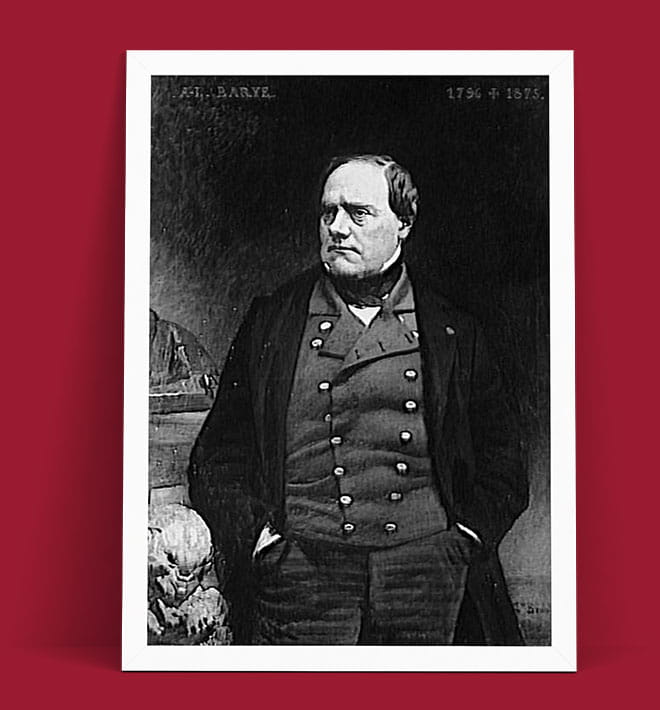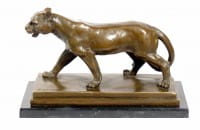1. Early Life and Artistic Formation
Born in Paris on September 24, 1796, Antoine-Louis Barye came from humble beginnings. His father was a silversmith, and young Barye initially trained in his father’s workshop, learning the technical skills of metalwork that would later inform his sculptural practice.
He later apprenticed under various artisans, including a military engraver and a goldsmith, before enrolling at the École des Beaux-Arts in 1818. There, he studied under the
neoclassical master François-Joseph Bosio and briefly with the great painter Antoine-Jean Gros. Barye initially pursued classical sculpture but was soon drawn to the vitality and structure of animals, which would become the focus of his life's work.
2. The Birth of the Animalier
Barye’s breakthrough came when he began modeling wild animals in bronze, capturing them not as static ornaments but as living, breathing beings engaged in survival, combat, or repose. At a time when animal sculpture was largely decorative and symbolic, Antoine Louis Barye sculptures stood out for their anatomical accuracy, movement, and emotional intensity.
He was a frequent visitor to the Jardin des Plantes in Paris, where he studied exotic animals from life, sketching and sculpting lions, tigers, panthers, elephants, and other wild creatures. This direct observation allowed him to achieve a degree of realism unmatched by his contemporaries.
3. Iconic Works and Style
Antoine Louis Barye sculptures are characterized by dynamic compositions, powerful musculature, and dramatic tension. Some of his most celebrated works include:
"Lion Crushing a Serpent" (Lion au serpent, 1832) – A bold and symbolic piece depicting a lion in the act of killing a serpent. This sculpture earned Barye critical acclaim when exhibited at the Paris Salon and is now housed in the Louvre.
"Jaguar Devouring a Hare" – A masterful representation of raw predatory instinct, showing a jaguar mid-meal with sinewy realism and forceful composition.
"Theseus and the Minotaur" – A mythological piece that combined human and animal anatomy, reflecting Barye’s ability to blend narrative and movement.
"Walking Lion", "Tiger Surprising an Antelope", and "Bear Surprised at a Nest" – Each demonstrating his love of wildlife and deep understanding of animal psychology.
Barye was also known for his meticulous modeling and texturing, as well as for pioneering patina techniques that gave his bronzes warmth, depth, and variety. His attention to form and musculature rivaled that of classical sculpture, yet he brought a modern sensibility and raw expressiveness to the medium.
4. Challenges and Recognition
Despite his talent, Barye faced significant obstacles throughout his career. He struggled to gain acceptance within the academic art world, which viewed animal sculpture as inferior to historical or mythological subjects. His frequent clashes with the French Salon juries led to periods of exclusion from official exhibitions.
To maintain creative independence, Barye partnered with the industrialist Emile Martin and began producing and selling his own bronzes — a pioneering move that allowed him to reach a broader audience. This self-publishing model made Antoine Louis Barye sculptures accessible to collectors and helped establish a strong market for animal bronzes in 19th-century France.
Gradually, Barye’s work gained the recognition it deserved. In 1868, he was elected to the prestigious Institut de France, and by the time of his death, he was widely celebrated as the leading animal sculptor of his era.
5. Legacy and Influence
Antoine-Louis Barye’s influence extended far beyond his lifetime. He inspired an entire generation of animaliers, including artists like Pierre-Jules Mêne and Isidore Bonheur. His emphasis on anatomical study, direct observation, and emotional expressiveness helped elevate animal sculpture from decorative to fine art status.
Barye’s works are now found in major museums around the world, including the Louvre, the Musée d'Orsay, the Metropolitan Museum of Art in New York, and the Walters Art Museum in Baltimore. His legacy also lives on in the Barye Monument on the Île Saint-Louis in Paris, where one of his majestic lions stands watch over the Seine.
Collectors and art historians continue to admire Antoine Louis Barye sculptures for their synthesis of realism, romanticism, and technical brilliance. Whether capturing the tense moment before a lion pounces or the quiet dignity of a standing elephant, Barye’s bronzes remain powerful testaments to his genius and to the natural world he so passionately observed.






